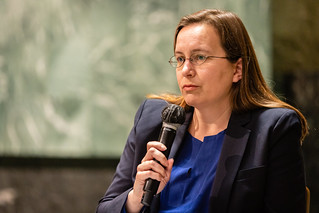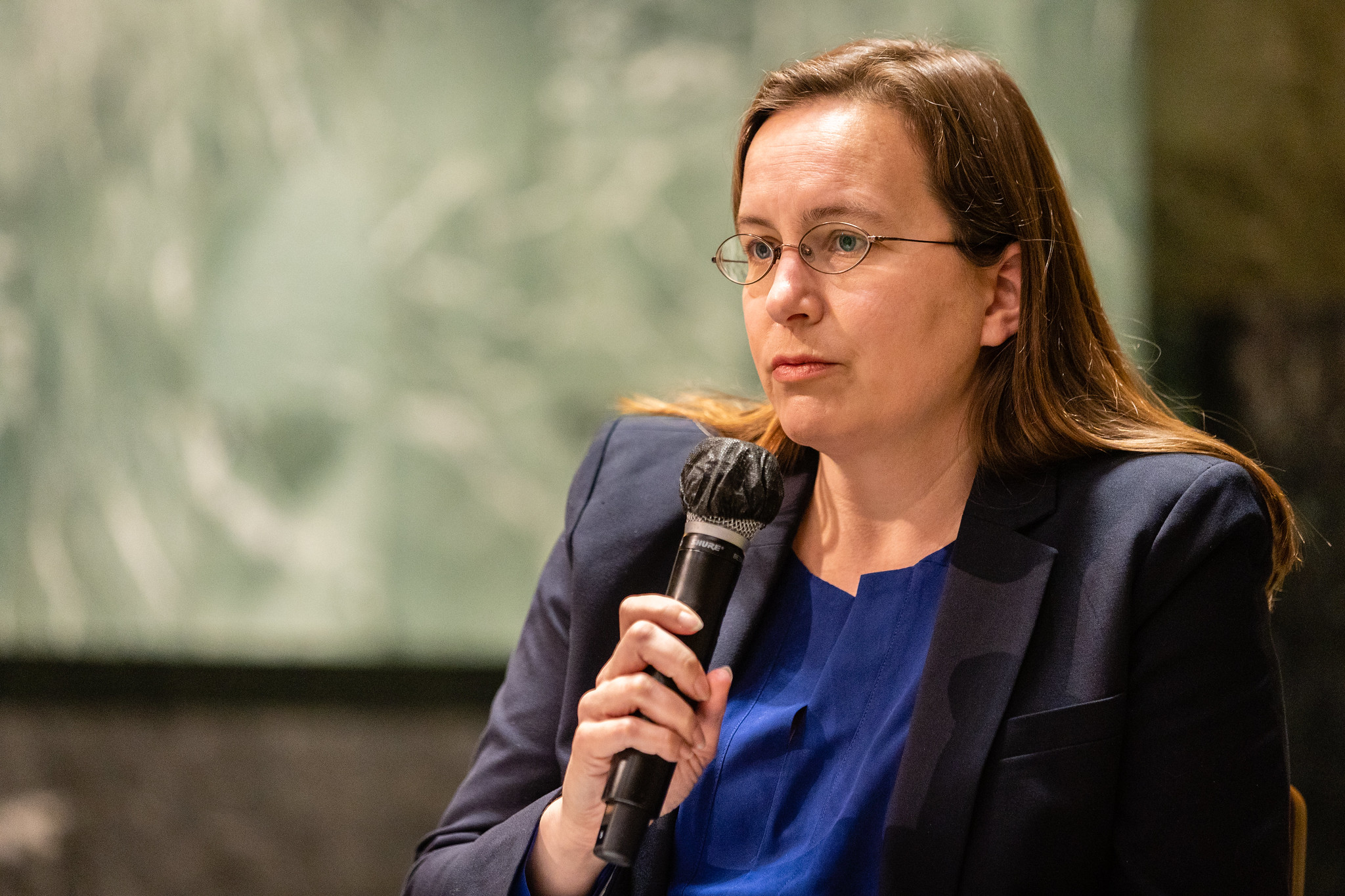
Last Friday, I was invited to speak at the Inter-Parliamentary Union’s 2022 Parliamentary Hearing at the United Nations, on a panel about ‘Making good on climate change commitments: The people vs. organized interests.’ This is a critical issue for governments as the fossil fuel industry continues to impede climate action. I wanted to share my remarks, below:
If you have been following conversations around climate change, you probably are familiar with a few key points:
- Climate impacts — droughts, floods, fires, severe storms — are worsening at an alarming rate, and are hitting the most vulnerable people, communities, and countries the hardest — which will be reiterated on February 28 with the IPCC’s WGII Sixth Assessment Report.
- It’s urgent that we act now to reduce these impacts, before they get much, much worse.
- Fossil fuels — oil, gas and coal — are the primary source of climate pollution — contributing 94 percent of carbon dioxide emissions and nearly three-quarters of climate changing emissions.
Starting from these points, I’d like to cover:
- How entrenched fossil fuel industry interests have slowed progress in addressing climate change.
- That even though there is a very long way to go and a very short time to address the climate crisis, there is now important momentum and hope.
- That there are now clear, timely opportunities for governments to act to phase out fossil fuels, particularly oil and gas, in a just and equitable way.
We – and the fossil fuel industry – have known that fossil fuels cause climate change for a long time.
As early as 1959, at an energy symposium organized by the American Petroleum Institute, a prominent physicist presented on the impacts of burning fossil fuels, saying carbon dioxide “causes a greenhouse effect” and “a temperature rise corresponding to a 10 percent increase in carbon dioxide will be sufficient to melt the ice cap and submerge New York…”
That was over 60 years ago.
Additionally, even though international climate negotiations began 30 years ago, the amount of fossil fuels as a percentage of the global energy supply has not changed. In 1992, the year the UN Framework Convention on Climate Change was established, fossil fuels were 80.7% of the global energy supply. As of 2019, in spite of extremely rapid growth and adoption of renewable energy, fossil fuels are still 80.9% of the global energy supply.
How can we have known for 60 years that fossil fuels are the central driver of climate change, and been negotiating international climate action for 30 years, but still not made significant progress on phasing out fossil fuels?
We have seen time and again how the fossil fuel industry has operated to maximize profits without regard to environmental or human rights impacts of its operations, and it has specifically obstructed action on climate change. This is a major force in delaying climate efforts.
Oil and gas companies now claim to be part of the solution, regularly making climate plans and commitments. But none of the current plans of any of the largest integrated oil and gas companies come close to aligning with the goals of the Paris Agreement to hold global warming to 1.5 degrees. This is greenwash, further delaying necessary action.
The industry and its backers continue to perpetuate myths about fossil fuel phase out. For instance:
- They say phasing out fossil fuels will cost jobs. This is not the case. Clean energy creates more jobs on average than fossil fuel energy, and can be scaled up as fossil fuels are phased out, expanding the total number of energy jobs.
- They say gas is needed as a bridge to clean energy. Wrong. Gas breaks the carbon budget and is not needed for grid reliability. Wind and solar are already the cheapest forms of bulk energy supply in most major markets.
- They say fossil fuels are needed for development. No. Distributed renewable energy is the cheapest and most efficient way to increase energy access. And oil and gas production in many countries is geared towards export, not reinforcing or providing energy resources to local economies.
Instead of favoring industry messages, governments should listen to underrepresented voices, women, young people, those from impacted communities, and civil society working to amplify these voices. Those who face higher risks and greater burdens from the impacts of climate change and of fossil fuel development need to be heard and valued in these conversations in order to create just and effective solutions.
Governments must act to curb the power of the industry and take action to phase out fossil fuels because, quite simply, if we don’t phase out fossil fuels, we will not solve the climate crisis.
Despite the enormity of the change we need to make, there is momentum and hope. For the last two decades, I have worked at the intersections of environment, development, and human rights. In particular, I have focused on actions that governments and institutions must take to address the root causes and impacts of environmental pollution and climate change.
When I started this work, phasing out oil and gas did not feature in climate policy discussions at all. Now, the increased recognition from governments, institutions, and even parts of the financial sector of the role of fossil fuels in climate change represents a sea change from where we were even just a few years ago.
Last year, following years of pressure from civil society groups and others, the International Energy Agency (IEA) came out with the finding that oil and gas in already-producing or under-development fields will be sufficient to meet demand in a world that limits warming to 1.5ºC. This Net Zero scenario is now incorporated in the World Energy Outlook, a publication widely used for making global energy decisions.
We also saw significant progress on the sidelines of COP 26 in Glasgow:
- The governments of Costa Rica and Denmark officially launched the Beyond Oil and Gas Alliance (BOGA), establishing the world’s first diplomatic initiative focused on keeping oil and gas in the ground. BOGA brings together countries and jurisdictions that have ended licensing for new oil and gas exploration and production and are setting an end date for their production.
- Additionally, nearly 40 countries and institutions launched a joint commitment to end international public finance for fossil fuels by the end of 2022 and instead prioritize public finance for clean energy. This commitment could directly shift at least USD 24.1 billion a year in public finance out of fossil fuels and into clean energy, based on OCI data from 2018-2020, which will help shift even larger flows of private finance.
This shift in framing and focus around climate change presents significant opportunities, and begins to chart a pathway that governments can take towards addressing fossil fuels’ role in climate change.
Those of us who care about climate, development, human rights, and inequality, and particularly, those of us with the power to act, must use these opportunities and this momentum to continue to change the narrative, offer pathways for change, and describe and adopt the steps necessary for a truly just transition.
Governments can act now to:
- Adopt policies to phase out exploration for and production of fossil fuels.
- Commit to end public finance and subsidies for fossil fuels.
- Support communities and workers that need help to make a just transition to clean energy.
- At the international level, cooperate to support countries that will need help to make this transition, as well as support in adapting to climate impacts we are already seeing.
- Continue expanding the conversation around energy and climate change to include more voices, working not just to address climate change but also to reverse the systems of inequity that are driving this crisis.
We have the means to make these changes, we now need to create the political will to make it happen. We stand ready to support governments and parliaments in working towards a swift, just, and equitable energy transition to avoid the worst climate impacts. Thank you very much.

